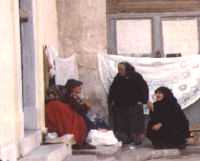January 1991

![]()
We have been in Athens for two days. Today Mike and I wanted to go to Korinthos, to see the ruins of ancient Corinth. The train to Korinthos departs every two hours, so after a late night we planned to catch the train at 11 a.m. After the one-and-a-half hour ride we would hike to the ruins, as they seemed to be a couple of miles from the modern town of Korinthos, according to the map.
It seemed to take forever to get from the President Hotel to the train station across town. Translating the Greek alphabetical symbols on the busses and street signs into their English counterparts was an agonizingly slow process, and it made us prone to miss our stops, or stasis in Greek, the word you had to call out to get the bus driver to stop. After one or two missed stops and backtracking, we finally made it to the train station. Late. The train had left 15 minutes before.
A bit disappointed, we made our way out to the nearby neighborhood, to explore while we waited for the 1 p.m. train. We found the entrance to Athens’ miniscule subway system; the map of the subway showed its entirety, about four stops in a straight line. The smallness of it intrigued us, and we were compelled to buy a ticket and explore, just as we had done with the subway/metro/underground/whatever, in all the cities we had visited.
Since there wasn’t much choice of which stop to get off at, we arbitrarily decided to get off at the No. 3 terminal. At the top of the stairs was an outdoor market that spanned several city blocks.
This wasn’t a tourist market. You could tell these were mostly locals, who actually lived and worked here. The intoxicating sights, sounds and smells permeated our senses. Orthodox churches were everywhere, ranging in style from elaborate cathedrals to humble chapels housed in crumbling stone buildings. And there was no shortage of Greek Orthodox clergymen, dressed in their black robes, beards and turban-like headpieces.
I began to learn that the farther east you travel, the more "foreign" foreign destinations become. The music, food, aromas, clothes, architecture, and even the alphabet, almost overwhelmed us in their strangeness. I realized with a start that this country was the cradle of civilization – the very civilization from which I came. I wondered what a really foreign country would be like!
We were so engrossed in the scene that we didn’t realize how much time had passed. We ran through the market, pushing past merchants, carts and pedestrians on our way back to the little subway. A quick journey back the way we came, and then a brisk jog to the train station, all the while hoping that the Greek rail system was the counterpart of U.S. domestic airlines: always a bit late.
We were sorry to find out that that this particular train was quite punctual. But we would not about let some bunch of foreigners spoil our day. Determined to enjoy ourselves, we would take the next train, the three o’clock, and still go to ancient Corinth.
We now had another two hours to kill. What to do? Not wanting to miss our train a third time, we decided to stay close by.
The neighborhood was a mixture of small businesses, homes and grassy lots that local children apparently had adopted as playgrounds. We found an ice-cream vendor and had a bit; near there was a winery. Not a big fancy winery that tourists would come visit, but a building full of casks aging wine, to be sold wholesale to restaurants, bars and hotels. Mike and I almost simultaneously felt the need to soothe our jangled nerves, after our whole train mishap.
Alas, the smallest volume they sold was a cask – which holds about 20 liters. I didn’t relish the thought of lugging around a big wooden barrel with five gallons of wine in it for the rest of the day.
Sensing our plight, the proprietor charitably went to find a bottle into which he could tap a barrel. Locating a 1250 ml bottle, he hammered a tap into the side of a cask of retsina, filled and corked the bottle and sold it to us for 1500 drachmas – about $5.